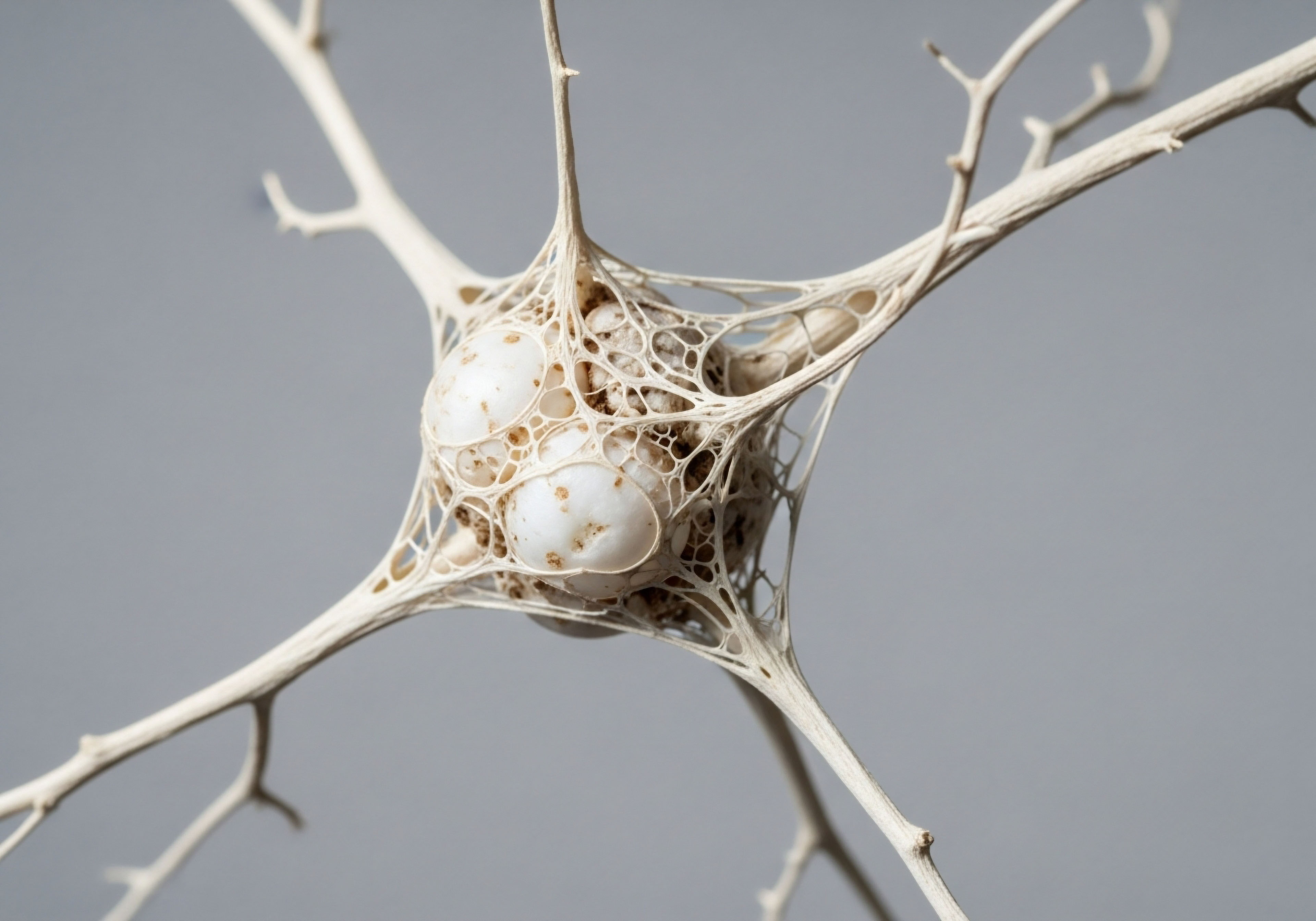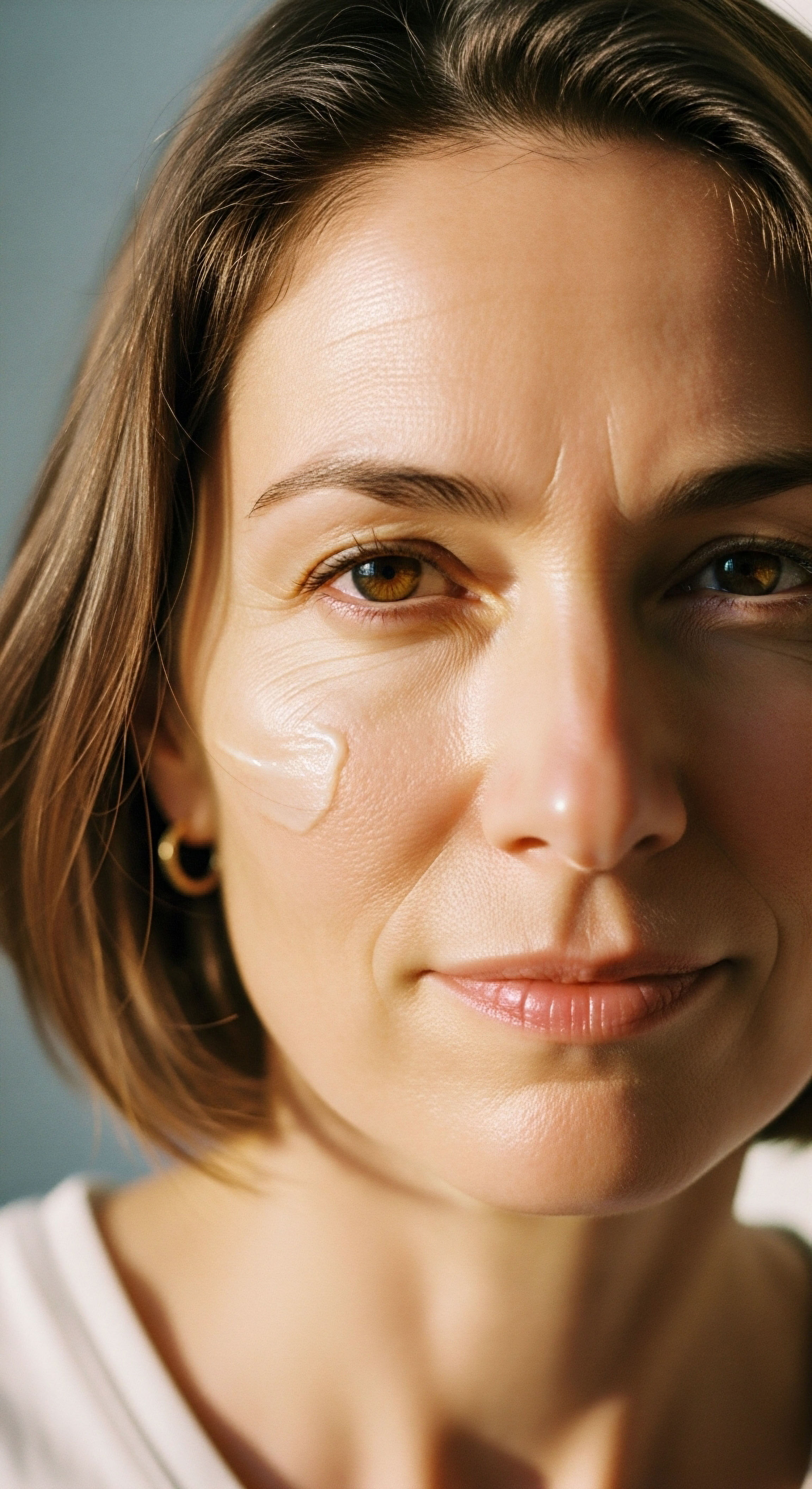

The Biological Imperative Sleep Dictates Your Real Age
Your chronological age is a simple tally of years. Your biological age, however, is a dynamic reflection of your cellular vitality, your system’s resilience, and the true state of your internal architecture. At the core of this architecture, dictating its integrity and pace of renewal, lies sleep.
It is not merely a period of inactivity, but a profound, active state where your body undertakes critical maintenance and optimization. When you consistently shortchange this vital process, you are not just losing hours of rest; you are accelerating the very mechanisms of aging at a cellular and systemic level.
The scientific evidence is unequivocal ∞ insufficient or poor-quality sleep directly contributes to an older biological age. This occurs through several interconnected pathways, each a testament to sleep’s indispensable role in maintaining the youthful function of your biological systems.
One of the most significant impacts of sleep is its role in cellular repair and regeneration. During deep sleep, your body orchestrates a complex symphony of processes designed to mend the daily wear and tear on your cells. DNA damage, an inevitable consequence of metabolic processes and environmental exposure, is actively repaired during sleep.
Studies reveal that total sleep deprivation can increase oxidative DNA damage by as much as 139%. Key hormones, including growth hormone and melatonin, are predominantly released during these restorative sleep stages. Growth hormone is fundamental for tissue repair and muscle growth, while melatonin acts as a potent antioxidant, protecting cells from damage. When sleep is compromised, these repair mechanisms falter, leading to an accumulation of cellular damage that accelerates the aging process.
Furthermore, sleep is critical for maintaining hormonal equilibrium, a delicate balance that profoundly influences aging. Chronic sleep loss significantly disrupts the body’s endocrine system. Cortisol, the primary stress hormone, shows elevated levels, particularly in the afternoon and evening, with insufficient sleep.
This elevation mimics the hormonal profile of aging and is linked to increased inflammation, insulin resistance, and impaired cognitive function. Research indicates that just one week of restricted sleep can increase afternoon and evening cortisol levels by 37-45%, disrupting the body’s natural stress response system.
Testosterone production in men, crucial for muscle mass, bone density, and vitality, is also impaired by sleep deprivation, with studies showing significant drops in levels after just a few nights of reduced sleep. For women, sleep disruption can impact reproductive hormones and the delicate balance required for overall endocrine health. These hormonal shifts driven by poor sleep contribute directly to the physiological changes we associate with aging.
The link between sleep, circadian rhythms, and metabolic health is another critical pillar of understanding sleep’s impact on biological age. Our bodies operate on an internal 24-hour clock, the circadian rhythm, which governs everything from hormone secretion and body temperature to metabolism and sleep-wake cycles.
When this rhythm is disrupted by irregular sleep patterns, late-night eating, or excessive artificial light exposure, metabolic processes become dysregulated. This misalignment increases the risk of insulin resistance, obesity, and type 2 diabetes, all hallmarks of accelerated biological aging.
The liver, pancreas, and fat cells all have peripheral clocks that are synchronized by the master clock in the brain, and these clocks regulate vital metabolic functions. Disrupting sleep effectively throws these metabolic regulators into disarray, leading to impaired glucose tolerance, inefficient fat metabolism, and increased inflammation.
Telomere length, the protective caps on the ends of our chromosomes, serves as a key biomarker for cellular aging. Shorter telomeres are associated with older biological age and increased risk of age-related diseases. Multiple studies have demonstrated a correlation between sleep disturbances and shorter telomere length.
Individuals reporting poor sleep quality or experiencing frequent micro-arousals during sleep often exhibit greater telomere shortening over time, suggesting that fragmented rest directly contributes to an accelerated aging pattern at the chromosomal level.
Findings support a role of sleep disturbances in increasing accumulation of damage, increased cellular senescence, shortening telomere length, altering the expression of telomerase activity, and accelerating epigenetic aging.


The Engineering of Rest Cellular Renewal and Hormonal Recalibration
Sleep is not a passive void; it is an active, intricately orchestrated biological process that engineers your body’s renewal. Understanding the mechanisms by which sleep facilitates cellular repair and hormonal recalibration reveals why its quality and duration are paramount to maintaining a youthful biological age. This sophisticated nightly maintenance is essential for counteracting the constant cellular attrition that occurs during wakefulness.

Cellular Architects ∞ DNA Repair and Protein Synthesis
During the deeper stages of non-REM sleep, your body becomes a highly efficient repair facility. Cells that have sustained damage from oxidative stress, environmental toxins, or the simple wear-and-tear of daily activity undergo critical restorative processes. This includes the activation of DNA repair mechanisms that fix daily damage and prevent mutations, thereby safeguarding your genetic integrity.
This is particularly vital for preventing the accumulation of DNA damage that can lead to cellular senescence or contribute to diseases like cancer. Furthermore, sleep significantly enhances protein synthesis. Proteins are the fundamental building blocks for cellular growth, muscle recovery, and tissue healing.
The surge in protein production during sleep ensures that damaged tissues are repaired, muscles recover from exertion, and cellular structures are replenished. Without adequate sleep, these fundamental repair processes are curtailed, leading to a faster rate of cellular aging and diminished capacity for regeneration.
The impact of sleep deprivation on these cellular processes is stark. Studies have shown that total sleep deprivation can dramatically increase oxidative DNA damage, while partial deprivation impairs the body’s ability to repair it. For instance, research on intestinal epithelium has indicated that total sleep deprivation can multiply dying cells and increase proliferating cells, disrupting cellular protection and DNA repair capabilities.

The Glymphatic System ∞ Brain Detoxification
One of the most remarkable discoveries in sleep science is the role of the glymphatic system. This waste-clearance pathway in the brain becomes highly active during sleep, particularly during non-REM sleep. It flushes out metabolic byproducts and potentially toxic proteins that accumulate in the brain during waking hours, including beta-amyloid, a protein associated with Alzheimer’s disease.
This nightly detoxification process is crucial for maintaining optimal brain function, clearing the cognitive fog, and preventing the long-term accumulation of neurotoxic waste that contributes to cognitive decline and accelerated brain aging. Disrupting this system through insufficient sleep compromises the brain’s ability to clear these harmful substances, impacting cognitive performance and potentially increasing the risk of neurodegenerative conditions.

Hormonal Recalibration ∞ The Master Regulators
Sleep acts as a master regulator for numerous hormones that influence metabolism, stress response, growth, and repair. The hypothalamic-pituitary axes, central to endocrine function, are profoundly influenced by sleep.
- Growth Hormone (GH): Released primarily during deep non-REM sleep, GH is essential for tissue repair, muscle growth, and cellular regeneration. Its decline with age is a significant factor in aging, and adequate sleep is critical for optimizing its natural release.
- Cortisol: While cortisol is necessary for alertness and stress response, its levels should naturally decrease in the evening and be lowest before bedtime. Sleep deprivation disrupts this pattern, leading to elevated evening cortisol, which promotes inflammation, insulin resistance, and visceral fat accumulation ∞ all markers of accelerated aging.
- Melatonin: The “hormone of darkness,” melatonin, regulates the sleep-wake cycle and acts as a powerful antioxidant. Its production is suppressed by light and stimulated by darkness, signaling the body to prepare for sleep and repair. Disruptions to melatonin production due to irregular sleep or light exposure impair both sleep quality and cellular protection.
- Testosterone: In men, testosterone production peaks during REM sleep. Chronic sleep restriction can lead to a significant reduction in testosterone levels, contributing to decreased libido, muscle mass, and energy ∞ effects commonly associated with aging.
- Appetite Hormones (Leptin and Ghrelin): Sleep deprivation profoundly impacts these hormones. Leptin, which signals satiety, decreases, while ghrelin, which stimulates appetite, increases. This hormonal imbalance drives increased hunger and cravings, often for calorie-dense foods, contributing to weight gain and metabolic dysfunction ∞ key components of biological aging.
The interconnectedness of these systems ∞ cellular repair, detoxification, and hormonal balance ∞ highlights why sleep is not an optional luxury but a fundamental biological necessity for maintaining youthfulness and vitality.
Total sleep deprivation increases oxidative DNA damage by 139%, while key hormones like growth hormone and melatonin, released during deep sleep, promote tissue regeneration and protect cells.


When to Prioritize Sleep Strategic Timing for Biological Optimization
The question is no longer if sleep impacts your biological age, but when and how you must strategically prioritize it to optimize your system. The timing, duration, and quality of your sleep are not arbitrary metrics; they are precise levers you can pull to influence your cellular health, hormonal balance, and metabolic resilience. Understanding these temporal dynamics transforms sleep from a passive necessity into an active intervention for sustained vitality.

The Golden Window ∞ Circadian Alignment for Peak Performance
Your body operates on an intrinsic 24-hour circadian rhythm, a master biological clock that orchestrates countless physiological processes, including sleep, hormone secretion, and metabolism. Aligning your sleep schedule with this natural rhythm is paramount. For most individuals, this means prioritizing sleep during the biological night, typically from 10 PM to 7 AM, aligning with natural light-dark cycles. This period is when your body is most primed for restorative processes.
Shift work, irregular sleep schedules, and excessive artificial light exposure after dusk all disrupt this crucial alignment. This circadian misalignment is a potent driver of metabolic dysfunction, hormonal imbalance, and accelerated cellular aging. Epidemiological studies consistently link disrupted circadian rhythms and poor sleep to increased risks of obesity, diabetes, cardiovascular disease, and even certain cancers. The consequences extend beyond mere fatigue; they represent a fundamental disorganization of your body’s internal temporal architecture.

The Sweet Spot ∞ Optimal Duration for Cellular Rejuvenation
While the exact duration can vary slightly between individuals, scientific consensus points to a consistent range for optimal health and biological age management. Adults generally require seven to nine hours of quality sleep per night. Consistently sleeping less than this ∞ often observed in individuals sleeping five to six hours ∞ is associated with a higher risk of chronic diseases and accelerated aging.
Studies have indicated that mothers sleeping less than seven hours in the early postpartum period were biologically older by three to seven years compared to those sleeping more. Conversely, while excessively long sleep durations (over nine hours) have also been linked to poorer outcomes in some studies, the primary concern for most modern individuals is insufficient sleep.
This seven-to-nine-hour window ensures you cycle through all necessary sleep stages ∞ light sleep, deep non-REM sleep, and REM sleep ∞ each contributing uniquely to physical repair, cognitive processing, and emotional regulation. Missing out on these stages due to insufficient duration compromises the effectiveness of cellular repair, hormonal recalibration, and brain detoxification.

Quality over Quantity ∞ The Pillars of Restorative Sleep
Achieving the optimal duration is only part of the equation; the quality of that sleep is equally critical. Restorative sleep is characterized by minimal disruptions, a consistent sleep architecture, and sufficient time spent in deep sleep and REM sleep. To optimize sleep quality, consider these strategic imperatives ∞
- Consistent Sleep Schedule: Go to bed and wake up around the same time every day, even on weekends. This reinforces your natural circadian rhythm and trains your body for predictable rest.
- Optimized Sleep Environment: Ensure your bedroom is dark, quiet, and cool. Darkness is crucial for melatonin production. A cool temperature (around 60-67°F or 15-19°C) promotes deeper sleep.
- Strategic Light Exposure: Maximize exposure to natural daylight, especially in the morning, to anchor your circadian clock. Minimize exposure to bright artificial light, particularly blue light from screens, in the hours leading up to bedtime.
- Mindful Nutrition and Hydration: Avoid heavy meals, caffeine, and alcohol close to bedtime, as these can disrupt sleep architecture and quality.
- Pre-Sleep Routine: Develop a calming wind-down routine ∞ reading, gentle stretching, meditation ∞ to signal to your body that it’s time to transition into sleep.
By strategically managing the timing, duration, and quality of your sleep, you actively engage in the process of biological optimization, ensuring your body performs its essential nightly recalibration and repair, thereby slowing the hands of your biological clock.
Consistently sleeping less than seven hours a night has been linked to biological aging markers comparable to adding three to seven years to your chronological age.

The Master Architect of Vitality Is the One Who Masters the Night
Your pursuit of peak performance and enduring vitality is fundamentally a pursuit of mastery over your internal biological systems. Sleep is not merely a pause in this pursuit; it is the engine room, the unseen architect, and the master calibrator. To understand sleep is to understand the very blueprint of aging and rejuvenation.
When you engineer your nights for optimal repair, hormonal balance, and metabolic recalibration, you are not just resting; you are actively sculpting your biological future, reclaiming your prime, and constructing a foundation of resilience that transcends mere chronological progression. The most profound biological upgrades are not found in external interventions alone, but in the disciplined reverence for the body’s innate capacity for renewal, unlocked each night through deliberate, high-quality rest.

Glossary

biological age

cellular repair

during sleep

total sleep deprivation

growth hormone

sleep deprivation

circadian rhythms

metabolic health

excessive artificial light exposure

telomere length

sleep quality

hormonal recalibration

restorative processes

non-rem sleep

dna damage

total sleep

glymphatic system

rem sleep

light exposure

hormonal balance




